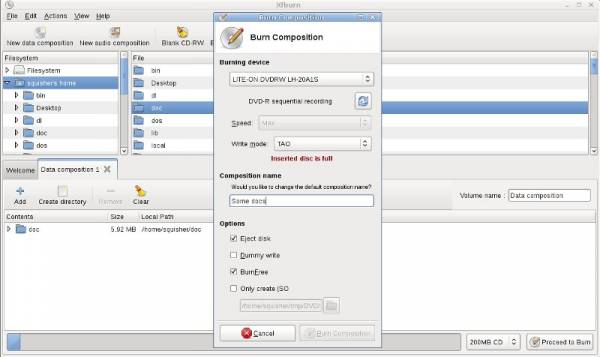This is an old revision of the document!

Xfburn
Introduction
Xfburn is a simple CD/DVD burning tool based on libburnia libraries. It can blank CD/DVD(-RW)s, burn and create iso images, audio CDs, as well as burn personal compositions of data to either CD or DVD. It Is stable, and under ongoing development.
The current version is 0.6.2, released on 2020-03-07. This release fixes a number of smaller bugs and uses more modern libraries for improved compatibility with today's software.
For more detailed information please have a look at the README or the NEWS file.
| xfburn dialog |
|---|

|
Functionality
xfburn is still a new program, and does not yet do all common burning related tasks.
Currently implemented is:
- Create data compositions
- Burn to CD, DVD, or BluRay (BD)
- Create ISO images
- Burn ISO images
- Create and burn audio CDs
- Blank discs
- Format and deformat DVD-RW discs
At this time there is no multisession support.
Note: Stream Recording disables error management for BD only, which increases the burning speed. Using it seems to be the best option since discs with errors tend to fail even when stream recording is disabled.
Audio CD support details
Included are two transcoders: basic, which just passes through uncompressed wav data, and gst (gstreamer), which can decode any audio file for which a gstreamer plugin is present.
The basic transcoder
Only CD-quality, uncompressed (PCM) Wave files can be added to an audio compilation. Use i.e. your favority audio player with a disc writer output mode / plugin to decompress your existing audio files. If .wav files are added to the compilation, their headers get checked to make sure they are of the right format. Note that this check is not very well tested (in particular it's not likely to work on big-endian machines like PowerPC). It does not require any external libraries
The gst transcoder
Based on the gstreamer library, it can decode pretty much any audio content, as long as you have the appropriate plugins installed. Note that by default most distributions do _not_ install these plugins. But a simple search for gstreamer plugins in your package manager should quickly allow you to install them.
You can at startup switch between the transcoders, see the command line help for more information.
Required Packages
- libisofs version 0.6.2 or newer
- libburn version 0.4.2 or newer
- WARNING: libburn 0.4.2 - 0.5.4 are API compatible, but might trigger an error in libburn's fifo code.
RECOMMENDED is version 0.5.6 or newer, where the bug was fixed.
Optional, but highly recommended
- gstreamer (1.0+, required for burning audio CDs from compressed music files)
- gstreamer pbutils (they usually come with gstreamer as far as I know)
- gstreamer plugins (look for the good, the bad and the ugly plugin pack, most likely you want all of these)
Let the highly recommended part be highlighted once more. Of course gstreamer will not matter if you do not plan on burning audio CDs, but the other two libraries will come in handy in almost all situations.
Optional, for maintenance
- libxslt (for creating docs)
The author works with both hal and thunar-vfs enabled, so there might be the occasional bug that breaks compilation without these components. Xfburn should work without these optional components, but it is not well tested at all. Should something not compile or work as expected, please report a bug, and it will get fixed.
Debugging
If xfburn crashes, freezes, or somehow makes no progress for you, then you can help greatly in debugging the problem. It does require you to build xfburn from the sources, and to install gdb. If you can handle that, here are the exact instructions:
1. Rebuild xfburn with debugging support - grab the sources, and run (you can update
`-j4` to match your core count): ``` $ autoconf $ ./configure && make clean all -j4 ```
2. Enable core dumps, then run xfburn until it hangs, or crashes:
``` $ ulimit -c unlimited; xfburn/xfburn 2>&1 | tee xfburn.output ```
3. From another terminal, kill xfburn (only if it hasn't crashed already, of coures)
``` $ kill -SEGV `pidof xfburn` ```
4. Get a backtrace from the coredump:
``` $ gdb xfburn/xfburn core.32270 --batch -ex 'thread apply all bt' > xfburn.backtrace ``` (Note that sometimes the core.xxxxxx file is just called core, and that 32270 is just an arbitrary number which was the process id - yours will be different)
5. Open up a bug report at our issue tracker for xfburn, and add
both the xfburn.output and the xfburn.backtrace files to it. Done! There is no need to attach the core dump, as it is heavily system dependent.
Future Plans
Missing functionality that would be nice to have: * Save and load compositions * Verification * Copy discs (needs backend support) * Automatic checksum creation * Plugin support
There is no, and never will be, a timeline for these. Let us know if you think
something is missing on this list. If you really need something implemented,
feel free to help us out 
At present development is in maintenance mode, as the author does not have a lot of time.
Authors
- David Mohr [david at mcbf.net]
- Mario Đanić [mario.danic at gmail.com]
- (retired) Jean-François Wauthy [pollux at xfce.org]
- Rene Kjellerup [rk.katana.steel at gmail.com]
Latest Release
0.6.2 (201920307)
We recommend to use a packaged version of Xfburn if it is available. Xfburn is packaged for several distributions, for example:
- Gentoo
- ArchLinux
- Foresight Linux
And probably many more…
Source Code Repository
Reporting Bugs
- Reporting Bugs – Open bug reports and how to report new bugs
Any comments are welcome! We aim to make xfburn a very easily usable program. So if you think something could be implemented differently, feel free to speak up and it will be considered.